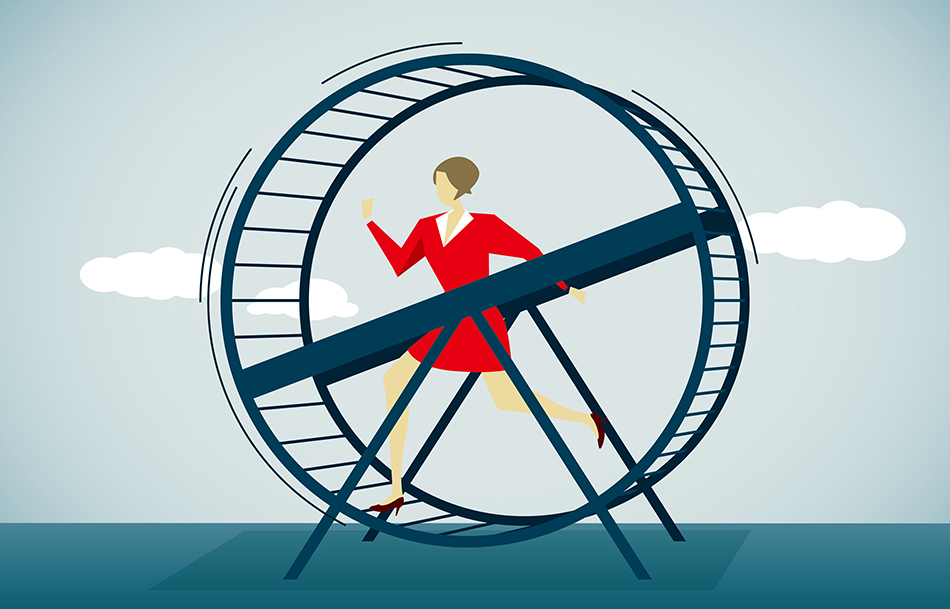Change how you think so you can change the way you work
Working too hard? You may be; British workers contributed £32bn to the economy in unpaid overtime last year. Oliver Burkeman looks at changing the way you think so you can change the way you work

As you tap out a reply to yet another work email on your glowing phone, in bed, at 11.30pm, it would be very easy to imagine that being overworked is simply an unavoidable fact of modern life. And we certainly do work hard: British employees contributed a staggering £32 billion to the economy in unpaid overtime in 2014, according to the Trades Union Congress.
What’s even worse is that the problem is self-perpetuating. Whenever we feel starved of time, researchers have shown, we tend to make foolish, hurried decisions – such as taking on even more projects – so we end up busier still.
But busyness isn’t solely a matter of our ever-lengthening to-do lists. It also results from various unhelpful messages we’ve internalised about the meaning of work. That’s excellent news, as it means that by questioning those messages, there’s hope of reducing the sense of being overwhelmed. Here are five ways we make overwork worse by the things we tell ourselves – and how to think about work more calmly and realistically instead:
1. “I have to work hard – I’ve just got too much to do!”
The easiest way to explain why you’re still sitting at your desk at 8pm, or catching up on emails at home at night, is simply that you have no choice: after all, few of us get to pick and choose which parts of the job we feel like doing. There is certainly some truth in that.
But we usually ignore another truth: in the modern workplace, there will always be too much to do. Plus, it’s a vicious cycle: the quicker you are at replying to emails, the more emails you’ll get back. The more you build a reputation in the workplace for handling projects efficiently, then the more projects will land in your lap.
What to do? Instead of telling yourself that with one more heave you’ll get everything done (you won’t!), focus instead on making sure that the right things get priority. For example, your boss’s emails might need a quick reply, but maybe others can wait; some meetings are crucial, but perhaps others can be skipped. Ultimately, it’s liberating to realise that work will never be ‘done’: it means you can stop blaming yourself for not keeping up, as it’s impossible to keep up with everything.
2. “They can’t manage without me. If I don’t work this hard, the company will fold”
It’s highly tempting to believe that you’re utterly indispensable – and if you were to cut back on work, you’d be betraying your colleagues. Partly, that’s because we’re social creatures, who naturally feel obligations to others. But it’s also partly because the alternative – the idea that things would go fine without you – is much scarier to contemplate.
Yet the truth, says Laura Vanderkam, author of the time management book I Know How She Does It (Portfolio Penguin, £9.99), is that ‘if any of us dropped dead tomorrow, Earth would not crash into the sun. It would keep spinning in its orbit as usual. And not only would Earth keep spinning, our organisations would likely keep functioning too.’
That seems harsh, but really, it’s a reason to relax. ‘Once you get your head around that idea, it’s easier to get a bit of perspective,’ says Vanderkam. ‘You can take a holiday. It’s OK.’
3. “The company culture dictates that I work myself to the bone”
Too many workplaces confuse effort with outcomes: managers send the message that what really counts is being at your desk, and being busy, instead of getting the best results. When you stop to think about it, a really good boss shouldn’t care how hard you work: if you’re doing the job brilliantly, it’s nobody else’s business how much elbow-grease it takes. But such enlightened attitudes are rare.
The next best alternative is to set simple and consistent boundaries. Be the person who always leaves at 6pm sharp, rather than the person who finds a different reason to grumble about each new project; soon, nobody will notice your leaving time. (It is also better to reliably reply to emails within a day or two, rather than sometimes answering instantly, and other times not at all.) When you set limits on your work hours, something curious happens: with surprising frequency, you’ll find work gets done in the time you’ve allotted for it, leaving you with time to breathe at last.
4. “I’m far less talented than everyone else here, so I have to work harder”
Most of us are familiar with the sense of feeling like a fraud – as if we somehow tricked our way into the job, and any day now, we will be exposed. And even the ultra-talented aren’t immune to this: ‘I have written 11 books,’ the celebrated author Maya Angelou once said, ‘but each time, I think, “uh-oh, they’re going to find out now. I’ve run a game on everybody and they’re going to find me out”.’
But this is based on a psychological error. The reason why you think you’re alone in your self-doubt is that you only get to hear your own internal monologue – when it comes to judging everyone else’s competence, you rely on their words and actions, and never hear their inner panic.
Research suggests that if you don’t feel like an imposter – at least some of the time – that’s probably because you are actually too incompetent to realise you’re incompetent. And so, ironically, feeling like a bit of a fraud is probably evidence that you aren’t.
5. “I enjoy working this hard – really!”
If you love long hours and a 24/7 commitment to the job, don’t let anyone else tell you you’re wrong: there’s no law decreeing that you must live a ‘balanced’ life of work, children, partners, hobbies and so on. (Think of your heroes – campaigners, sports people, celebrities – and you’ll realise many of them had decidedly ‘unbalanced’ lives.)
That said, it’s dangerously easy to convince yourself you love hard work when really it’s a kind of avoidance. Perhaps it’s too scary to contemplate that what you really want is to cut your hours and your income, in order to see more of your children? Maybe your marriage is strained, and it’s easier to hide out at work than confront the problems at home? (Though overwork will make problems worse.)
Busyness, writes essayist Tim Kreider, is often a way of convincing ourselves we’re fulfilled when we’re not: ‘Obviously your life cannot possibly be silly or trivial or meaningless if you are so busy, completely booked, in demand every hour of the day.’ In a quiet moment, ask yourself these two tough questions: do you genuinely love your job, and – if you don’t – is it really beyond your control to make a change?
Photograph: iStock








